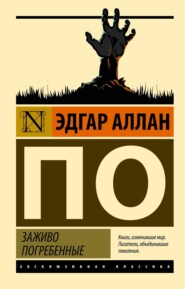По всем вопросам обращайтесь на: info@litportal.ru
(©) 2003-2025.
✖
The Works of Edgar Allan Poe — Volume 2
Настройки чтения
Размер шрифта
Высота строк
Поля
“There was another circumstance which tended to restore my self-possession; and this was the cessation of the wind, which could not reach us in our present situation — for, as you saw yourself, the belt of surf is considerably lower than the general bed of the ocean, and this latter now towered above us, a high, black, mountainous ridge. If you have never been at sea in a heavy gale, you can form no idea of the confusion of mind occasioned by the wind and spray together. They blind, deafen, and strangle you, and take away all power of action or reflection. But we were now, in a great measure, rid of these annoyances — just as death-condemned felons in prison are allowed petty indulgences, forbidden them while their doom is yet uncertain.
“How often we made the circuit of the belt it is impossible to say. We careered round and round for perhaps an hour, flying rather than floating, getting gradually more and more into the middle of the surge, and then nearer and nearer to its horrible inner edge. All this time I had never let go of the ring-bolt. My brother was at the stern, holding on to a small empty water-cask which had been securely lashed under the coop of the counter, and was the only thing on deck that had not been swept overboard when the gale first took us. As we approached the brink of the pit he let go his hold upon this, and made for the ring, from which, in the agony of his terror, he endeavored to force my hands, as it was not large enough to afford us both a secure grasp. I never felt deeper grief than when I saw him attempt this act — although I knew he was a madman when he did it — a raving maniac through sheer fright. I did not care, however, to contest the point with him. I knew it could make no difference whether either of us held on at all; so I let him have the bolt, and went astern to the cask. This there was no great difficulty in doing; for the smack flew round steadily enough, and upon an even keel — only swaying to and fro, with the immense sweeps and swelters of the whirl. Scarcely had I secured myself in my new position, when we gave a wild lurch to starboard, and rushed headlong into the abyss. I muttered a hurried prayer to God, and thought all was over.
“As I felt the sickening sweep of the descent, I had instinctively tightened my hold upon the barrel, and closed my eyes. For some seconds I dared not open them — while I expected instant destruction, and wondered that I was not already in my death-struggles with the water. But moment after moment elapsed. I still lived. The sense of falling had ceased; and the motion of the vessel seemed much as it had been before, while in the belt of foam, with the exception that she now lay more along. I took courage, and looked once again upon the scene.
“Never shall I forget the sensations of awe, horror, and admiration with which I gazed about me. The boat appeared to be hanging, as if by magic, midway down, upon the interior surface of a funnel vast in circumference, prodigious in depth, and whose perfectly smooth sides might have been mistaken for ebony, but for the bewildering rapidity with which they spun around, and for the gleaming and ghastly radiance they shot forth, as the rays of the full moon, from that circular rift amid the clouds which I have already described, streamed in a flood of golden glory along the black walls, and far away down into the inmost recesses of the abyss.
“At first I was too much confused to observe anything accurately. The general burst of terrific grandeur was all that I beheld. When I recovered myself a little, however, my gaze fell instinctively downward. In this direction I was able to obtain an unobstructed view, from the manner in which the smack hung on the inclined surface of the pool. She was quite upon an even keel — that is to say, her deck lay in a plane parallel with that of the water — but this latter sloped at an angle of more than forty-five degrees, so that we seemed to be lying upon our beam-ends. I could not help observing, nevertheless, that I had scarcely more difficulty in maintaining my hold and footing in this situation, than if we had been upon a dead level; and this, I suppose, was owing to the speed at which we revolved.
“The rays of the moon seemed to search the very bottom of the profound gulf; but still I could make out nothing distinctly, on account of a thick mist in which everything there was enveloped, and over which there hung a magnificent rainbow, like that narrow and tottering bridge which Mussulmen say is the only pathway between Time and Eternity. This mist, or spray, was no doubt occasioned by the clashing of the great walls of the funnel, as they all met together at the bottom — but the yell that went up to the Heavens from out of that mist, I dare not attempt to describe.
“Our first slide into the abyss itself, from the belt of foam above, had carried us a great distance down the slope; but our farther descent was by no means proportionate. Round and round we swept — not with any uniform movement — but in dizzying swings and jerks, that sent us sometimes only a few hundred yards — sometimes nearly the complete circuit of the whirl. Our progress downward, at each revolution, was slow, but very perceptible.
“Looking about me upon the wide waste of liquid ebony on which we were thus borne, I perceived that our boat was not the only object in the embrace of the whirl. Both above and below us were visible fragments of vessels, large masses of building timber and trunks of trees, with many smaller articles, such as pieces of house furniture, broken boxes, barrels and staves. I have already described the unnatural curiosity which had taken the place of my original terrors. It appeared to grow upon me as I drew nearer and nearer to my dreadful doom. I now began to watch, with a strange interest, the numerous things that floated in our company. I must have been delirious — for I even sought amusement in speculating upon the relative velocities of their several descents toward the foam below. ‘This fir tree,’ I found myself at one time saying, ‘will certainly be the next thing that takes the awful plunge and disappears,’ — and then I was disappointed to find that the wreck of a Dutch merchant ship overtook it and went down before. At length, after making several guesses of this nature, and being deceived in all — this fact — the fact of my invariable miscalculation — set me upon a train of reflection that made my limbs again tremble, and my heart beat heavily once more.
“It was not a new terror that thus affected me, but the dawn of a more exciting hope. This hope arose partly from memory, and partly from present observation. I called to mind the great variety of buoyant matter that strewed the coast of Lofoden, having been absorbed and then thrown forth by the Moskoe-ström. By far the greater number of the articles were shattered in the most extraordinary way — so chafed and roughened as to have the appearance of being stuck full of splinters — but then I distinctly recollected that there were some of them which were not disfigured at all. Now I could not account for this difference except by supposing that the roughened fragments were the only ones which had been completely absorbed— that the others had entered the whirl at so late a period of the tide, or, for some reason, had descended so slowly after entering, that they did not reach the bottom before the turn of the flood came, or of the ebb, as the case might be. I conceived it possible, in either instance, that they might thus be whirled up again to the level of the ocean, without undergoing the fate of those which had been drawn in more early, or absorbed more rapidly. I made, also, three important observations. The first was, that, as a general rule, the larger the bodies were, the more rapid their descent — the second, that, between two masses of equal extent, the one spherical, and the other of any other shape, the superiority in speed of descent was with the sphere — the third, that, between two masses of equal size, the one cylindrical, and the other of any other shape, the cylinder was absorbed the more slowly. Since my escape, I have had several conversations on this subject with an old school-master of the district; and it was from him that I learned the use of the words ‘cylinder’ and ‘sphere.’ He explained to me — although I have forgotten the explanation — how what I observed was, in fact, the natural consequence of the forms of the floating fragments — and showed me how it happened that a cylinder, swimming in a vortex, offered more resistance to its suction, and was drawn in with greater difficulty than an equally bulky body, of any form whatever. (*1)
“There was one startling circumstance which went a great way in enforcing these observations, and rendering me anxious to turn them to account, and this was that, at every revolution, we passed something like a barrel, or else the yard or the mast of a vessel, while many of these things, which had been on our level when I first opened my eyes upon the wonders of the whirlpool, were now high up above us, and seemed to have moved but little from their original station.
“I no longer hesitated what to do. I resolved to lash myself securely to the water cask upon which I now held, to cut it loose from the counter, and to throw myself with it into the water. I attracted my brother’s attention by signs, pointed to the floating barrels that came near us, and did everything in my power to make him understand what I was about to do. I thought at length that he comprehended my design — but, whether this was the case or not, he shook his head despairingly, and refused to move from his station by the ring-bolt. It was impossible to reach him; the emergency admitted of no delay; and so, with a bitter struggle, I resigned him to his fate, fastened myself to the cask by means of the lashings which secured it to the counter, and precipitated myself with it into the sea, without another moment’s hesitation.
“The result was precisely what I had hoped it might be. As it is myself who now tell you this tale — as you see that I did escape — and as you are already in possession of the mode in which this escape was effected, and must therefore anticipate all that I have farther to say — I will bring my story quickly to conclusion. It might have been an hour, or thereabout, after my quitting the smack, when, having descended to a vast distance beneath me, it made three or four wild gyrations in rapid succession, and, bearing my loved brother with it, plunged headlong, at once and forever, into the chaos of foam below. The barrel to which I was attached sunk very little farther than half the distance between the bottom of the gulf and the spot at which I leaped overboard, before a great change took place in the character of the whirlpool. The slope of the sides of the vast funnel became momently less and less steep. The gyrations of the whirl grew, gradually, less and less violent. By degrees, the froth and the rainbow disappeared, and the bottom of the gulf seemed slowly to uprise. The sky was clear, the winds had gone down, and the full moon was setting radiantly in the west, when I found myself on the surface of the ocean, in full view of the shores of Lofoden, and above the spot where the pool of the Moskoe-ström had been. It was the hour of the slack — but the sea still heaved in mountainous waves from the effects of the hurricane. I was borne violently into the channel of the Ström, and in a few minutes was hurried down the coast into the ‘grounds’ of the fishermen. A boat picked me up — exhausted from fatigue — and (now that the danger was removed) speechless from the memory of its horror. Those who drew me on board were my old mates and daily companions — but they knew me no more than they would have known a traveller from the spirit-land. My hair which had been raven-black the day before, was as white as you see it now. They say too that the whole expression of my countenance had changed. I told them my story — they did not believe it. I now tell it to you— and I can scarcely expect you to put more faith in it than did the merry fishermen of Lofoden.”
VON KEMPELEN AND HIS DISCOVERY
AFTER THE very minute and elaborate paper by Arago, to say nothing of the summary in ‘Silliman’s Journal,’ with the detailed statement just published by Lieutenant Maury, it will not be supposed, of course, that in offering a few hurried remarks in reference to Von Kempelen’s discovery, I have any design to look at the subject in a scientific point of view. My object is simply, in the first place, to say a few words of Von Kempelen himself (with whom, some years ago, I had the honor of a slight personal acquaintance), since every thing which concerns him must necessarily, at this moment, be of interest; and, in the second place, to look in a general way, and speculatively, at the results of the discovery.
It may be as well, however, to premise the cursory observations which I have to offer, by denying, very decidedly, what seems to be a general impression (gleaned, as usual in a case of this kind, from the newspapers), viz.: that this discovery, astounding as it unquestionably is, is unanticipated.
By reference to the ‘Diary of Sir Humphrey Davy’ (Cottle and Munroe, London, pp. 150), it will be seen at pp. 53 and 82, that this illustrious chemist had not only conceived the idea now in question, but had actually made no inconsiderable progress, experimentally, in the very identical analysis now so triumphantly brought to an issue by Von Kempelen, who although he makes not the slightest allusion to it, is, without doubt (I say it unhesitatingly, and can prove it, if required), indebted to the ‘Diary’ for at least the first hint of his own undertaking.
The paragraph from the ‘Courier and Enquirer,’ which is now going the rounds of the press, and which purports to claim the invention for a Mr. Kissam, of Brunswick, Maine, appears to me, I confess, a little apocryphal, for several reasons; although there is nothing either impossible or very improbable in the statement made. I need not go into details. My opinion of the paragraph is founded principally upon its manner. It does not look true. Persons who are narrating facts, are seldom so particular as Mr. Kissam seems to be, about day and date and precise location. Besides, if Mr. Kissam actually did come upon the discovery he says he did, at the period designated — nearly eight years ago — how happens it that he took no steps, on the instant, to reap the immense benefits which the merest bumpkin must have known would have resulted to him individually, if not to the world at large, from the discovery? It seems to me quite incredible that any man of common understanding could have discovered what Mr. Kissam says he did, and yet have subsequently acted so like a baby — so like an owl — as Mr. Kissam admits that he did. By-the-way, who is Mr. Kissam? and is not the whole paragraph in the ‘Courier and Enquirer’ a fabrication got up to ‘make a talk’? It must be confessed that it has an amazingly moon-hoaxy-air. Very little dependence is to be placed upon it, in my humble opinion; and if I were not well aware, from experience, how very easily men of science are mystified, on points out of their usual range of inquiry, I should be profoundly astonished at finding so eminent a chemist as Professor Draper, discussing Mr. Kissam’s (or is it Mr. Quizzem’s?) pretensions to the discovery, in so serious a tone.
But to return to the ‘Diary’ of Sir Humphrey Davy. This pamphlet was not designed for the public eye, even upon the decease of the writer, as any person at all conversant with authorship may satisfy himself at once by the slightest inspection of the style. At page 13, for example, near the middle, we read, in reference to his researches about the protoxide of azote: ‘In less than half a minute the respiration being continued, diminished gradually and were succeeded by analogous to gentle pressure on all the muscles.’ That the respiration was not ‘diminished,’ is not only clear by the subsequent context, but by the use of the plural, ‘were.’ The sentence, no doubt, was thus intended: ‘In less than half a minute, the respiration [being continued, these feelings] diminished gradually, and were succeeded by [a sensation] analogous to gentle pressure on all the muscles.’ A hundred similar instances go to show that the MS. so inconsiderately published, was merely a rough note-book, meant only for the writer’s own eye, but an inspection of the pamphlet will convince almost any thinking person of the truth of my suggestion. The fact is, Sir Humphrey Davy was about the last man in the world to commit himself on scientific topics. Not only had he a more than ordinary dislike to quackery, but he was morbidly afraid of appearing empirical; so that, however fully he might have been convinced that he was on the right track in the matter now in question, he would never have spoken out, until he had every thing ready for the most practical demonstration. I verily believe that his last moments would have been rendered wretched, could he have suspected that his wishes in regard to burning this ‘Diary’ (full of crude speculations) would have been unattended to; as, it seems, they were. I say ‘his wishes,’ for that he meant to include this note-book among the miscellaneous papers directed ‘to be burnt,’ I think there can be no manner of doubt. Whether it escaped the flames by good fortune or by bad, yet remains to be seen. That the passages quoted above, with the other similar ones referred to, gave Von Kempelen the hint, I do not in the slightest degree question; but I repeat, it yet remains to be seen whether this momentous discovery itself (momentous under any circumstances) will be of service or disservice to mankind at large. That Von Kempelen and his immediate friends will reap a rich harvest, it would be folly to doubt for a moment. They will scarcely be so weak as not to ‘realize,’ in time, by large purchases of houses and land, with other property of intrinsic value.
In the brief account of Von Kempelen which appeared in the ‘Home Journal,’ and has since been extensively copied, several misapprehensions of the German original seem to have been made by the translator, who professes to have taken the passage from a late number of the Presburg ‘Schnellpost.’ ‘Viele’ has evidently been misconceived (as it often is), and what the translator renders by ‘sorrows,’ is probably ‘lieden,’ which, in its true version, ‘sufferings,’ would give a totally different complexion to the whole account; but, of course, much of this is merely guess, on my part.
Von Kempelen, however, is by no means ‘a misanthrope,’ in appearance, at least, whatever he may be in fact. My acquaintance with him was casual altogether; and I am scarcely warranted in saying that I know him at all; but to have seen and conversed with a man of so prodigious a notoriety as he has attained, or will attain in a few days, is not a small matter, as times go.
‘The Literary World’ speaks of him, confidently, as a native of Presburg (misled, perhaps, by the account in ‘The Home Journal’) but I am pleased in being able to state positively, since I have it from his own lips, that he was born in Utica, in the State of New York, although both his parents, I believe, are of Presburg descent. The family is connected, in some way, with Maelzel, of Automaton-chess-player memory. In person, he is short and stout, with large, fat, blue eyes, sandy hair and whiskers, a wide but pleasing mouth, fine teeth, and I think a Roman nose. There is some defect in one of his feet. His address is frank, and his whole manner noticeable for bonhomie. Altogether, he looks, speaks, and acts as little like ‘a misanthrope’ as any man I ever saw. We were fellow-sojourners for a week about six years ago, at Earl’s Hotel, in Providence, Rhode Island; and I presume that I conversed with him, at various times, for some three or four hours altogether. His principal topics were those of the day, and nothing that fell from him led me to suspect his scientific attainments. He left the hotel before me, intending to go to New York, and thence to Bremen; it was in the latter city that his great discovery was first made public; or, rather, it was there that he was first suspected of having made it. This is about all that I personally know of the now immortal Von Kempelen; but I have thought that even these few details would have interest for the public.
There can be little question that most of the marvellous rumors afloat about this affair are pure inventions, entitled to about as much credit as the story of Aladdin’s lamp; and yet, in a case of this kind, as in the case of the discoveries in California, it is clear that the truth may be stranger than fiction. The following anecdote, at least, is so well authenticated, that we may receive it implicitly.
Von Kempelen had never been even tolerably well off during his residence at Bremen; and often, it was well known, he had been put to extreme shifts in order to raise trifling sums. When the great excitement occurred about the forgery on the house of Gutsmuth & Co., suspicion was directed toward Von Kempelen, on account of his having purchased a considerable property in Gasperitch Lane, and his refusing, when questioned, to explain how he became possessed of the purchase money. He was at length arrested, but nothing decisive appearing against him, was in the end set at liberty. The police, however, kept a strict watch upon his movements, and thus discovered that he left home frequently, taking always the same road, and invariably giving his watchers the slip in the neighborhood of that labyrinth of narrow and crooked passages known by the flash name of the ‘Dondergat.’ Finally, by dint of great perseverance, they traced him to a garret in an old house of seven stories, in an alley called Flatzplatz, — and, coming upon him suddenly, found him, as they imagined, in the midst of his counterfeiting operations. His agitation is represented as so excessive that the officers had not the slightest doubt of his guilt. After hand-cuffing him, they searched his room, or rather rooms, for it appears he occupied all the mansarde.
Opening into the garret where they caught him, was a closet, ten feet by eight, fitted up with some chemical apparatus, of which the object has not yet been ascertained. In one corner of the closet was a very small furnace, with a glowing fire in it, and on the fire a kind of duplicate crucible — two crucibles connected by a tube. One of these crucibles was nearly full of lead in a state of fusion, but not reaching up to the aperture of the tube, which was close to the brim. The other crucible had some liquid in it, which, as the officers entered, seemed to be furiously dissipating in vapor. They relate that, on finding himself taken, Kempelen seized the crucibles with both hands (which were encased in gloves that afterwards turned out to be asbestic), and threw the contents on the tiled floor. It was now that they hand-cuffed him; and before proceeding to ransack the premises they searched his person, but nothing unusual was found about him, excepting a paper parcel, in his coat-pocket, containing what was afterward ascertained to be a mixture of antimony and some unknown substance, in nearly, but not quite, equal proportions. All attempts at analyzing the unknown substance have, so far, failed, but that it will ultimately be analyzed, is not to be doubted.
Passing out of the closet with their prisoner, the officers went through a sort of ante-chamber, in which nothing material was found, to the chemist’s sleeping-room. They here rummaged some drawers and boxes, but discovered only a few papers, of no importance, and some good coin, silver and gold. At length, looking under the bed, they saw a large, common hair trunk, without hinges, hasp, or lock, and with the top lying carelessly across the bottom portion. Upon attempting to draw this trunk out from under the bed, they found that, with their united strength (there were three of them, all powerful men), they ‘could not stir it one inch.’ Much astonished at this, one of them crawled under the bed, and looking into the trunk, said:
‘No wonder we couldn’t move it — why it’s full to the brim of old bits of brass!’
Putting his feet, now, against the wall so as to get a good purchase, and pushing with all his force, while his companions pulled with all theirs, the trunk, with much difficulty, was slid out from under the bed, and its contents examined. The supposed brass with which it was filled was all in small, smooth pieces, varying from the size of a pea to that of a dollar; but the pieces were irregular in shape, although more or less flat-looking, upon the whole, ‘very much as lead looks when thrown upon the ground in a molten state, and there suffered to grow cool.’ Now, not one of these officers for a moment suspected this metal to be any thing but brass. The idea of its being gold never entered their brains, of course; how could such a wild fancy have entered it? And their astonishment may be well conceived, when the next day it became known, all over Bremen, that the ‘lot of brass’ which they had carted so contemptuously to the police office, without putting themselves to the trouble of pocketing the smallest scrap, was not only gold — real gold — but gold far finer than any employed in coinage-gold, in fact, absolutely pure, virgin, without the slightest appreciable alloy.
I need not go over the details of Von Kempelen’s confession (as far as it went) and release, for these are familiar to the public. That he has actually realized, in spirit and in effect, if not to the letter, the old chimaera of the philosopher’s stone, no sane person is at liberty to doubt. The opinions of Arago are, of course, entitled to the greatest consideration; but he is by no means infallible; and what he says of bismuth, in his report to the Academy, must be taken cum grano salis. The simple truth is, that up to this period all analysis has failed; and until Von Kempelen chooses to let us have the key to his own published enigma, it is more than probable that the matter will remain, for years, in statu quo. All that as yet can fairly be said to be known is, that ‘Pure gold can be made at will, and very readily from lead in connection with certain other substances, in kind and in proportions, unknown.’
Speculation, of course, is busy as to the immediate and ultimate results of this discovery — a discovery which few thinking persons will hesitate in referring to an increased interest in the matter of gold generally, by the late developments in California; and this reflection brings us inevitably to another — the exceeding inopportuneness of Von Kempelen’s analysis. If many were prevented from adventuring to California, by the mere apprehension that gold would so materially diminish in value, on account of its plentifulness in the mines there, as to render the speculation of going so far in search of it a doubtful one — what impression will be wrought now, upon the minds of those about to emigrate, and especially upon the minds of those actually in the mineral region, by the announcement of this astounding discovery of Von Kempelen? a discovery which declares, in so many words, that beyond its intrinsic worth for manufacturing purposes (whatever that worth may be), gold now is, or at least soon will be (for it cannot be supposed that Von Kempelen can long retain his secret), of no greater value than lead, and of far inferior value to silver. It is, indeed, exceedingly difficult to speculate prospectively upon the consequences of the discovery, but one thing may be positively maintained — that the announcement of the discovery six months ago would have had material influence in regard to the settlement of California.
In Europe, as yet, the most noticeable results have been a rise of two hundred per cent. in the price of lead, and nearly twenty-five per cent. that of silver.
MESMERIC REVELATION
WHATEVER doubt may still envelop the rationale of mesmerism, its startling facts are now almost universally admitted. Of these latter, those who doubt, are your mere doubters by profession — an unprofitable and disreputable tribe. There can be no more absolute waste of time than the attempt to prove, at the present day, that man, by mere exercise of will, can so impress his fellow, as to cast him into an abnormal condition, of which the phenomena resemble very closely those of death, or at least resemble them more nearly than they do the phenomena of any other normal condition within our cognizance; that, while in this state, the person so impressed employs only with effort, and then feebly, the external organs of sense, yet perceives, with keenly refined perception, and through channels supposed unknown, matters beyond the scope of the physical organs; that, moreover, his intellectual faculties are wonderfully exalted and invigorated; that his sympathies with the person so impressing him are profound; and, finally, that his susceptibility to the impression increases with its frequency, while, in the same proportion, the peculiar phenomena elicited are more extended and more pronounced.
I say that these — which are the laws of mesmerism in its general features — it would be supererogation to demonstrate; nor shall I
inflict upon my readers so needless a demonstration; to-day. My purpose at present is a very different one indeed. I am impelled, even in the teeth of a world of prejudice, to detail without comment the very remarkable substance of a colloquy, occurring between a sleep-waker and myself.
I had been long in the habit of mesmerizing the person in question, (Mr. Vankirk,) and the usual acute susceptibility and exaltation of the mesmeric perception had supervened. For many months he had been laboring under confirmed phthisis, the more distressing effects of which had been relieved by my manipulations; and on the night of
Wednesday, the fifteenth instant, I was summoned to his bedside.
The invalid was suffering with acute pain in the region of the heart, and breathed with great difficulty, having all the ordinary symptoms of asthma. In spasms such as these he had usually found relief from the application of mustard to the nervous centres, but to-night this had been attempted in vain.
As I entered his room he greeted me with a cheerful smile, and although evidently in much bodily pain, appeared to be, mentally, quite at ease.
“I sent for you to-night,” he said, “not so much to administer to my bodily ailment, as to satisfy me concerning certain psychal impressions which, of late, have occasioned me much anxiety and surprise. I need not tell you how sceptical I have hitherto been on the topic of the soul’s immortality. I cannot deny that there has always existed, as if in that very soul which I have been denying, a vague half-sentiment of its own existence. But this half-sentiment at no time amounted to conviction. With it my reason had nothing to do.
All attempts at logical inquiry resulted, indeed, in leaving me more sceptical than before. I had been advised to study Cousin. I studied him in his own works as well as in those of his European and American echoes. The ‘Charles Elwood’ of Mr. Brownson, for example, was placed in my hands. I read it with profound attention. Throughout I found it logical, but the portions which were not merely logical were unhappily the initial arguments of the disbelieving hero of the book. In his summing up it seemed evident to me that the reasoner had not even succeeded in convincing himself. His end had plainly forgotten his beginning, like the government of Trinculo. In short, I was not long in perceiving that if man is to be intellectually convinced of his own immortality, he will never be so convinced by the mere abstractions which have been so long the fashion of the moralists of England, of
France, and of Germany. Abstractions may amuse and exercise, but take no hold on the mind. Here upon earth, at least, philosophy, I am persuaded, will always in vain call upon us to look upon qualities as things. The will may assent — the soul — the intellect, never.
“I repeat, then, that I only half felt, and never intellectually believed. But latterly there has been a certain deepening of the feeling, until it has come so nearly to resemble the acquiescence of reason, that I find it difficult to distinguish between the two. I am enabled, too, plainly to trace this effect to the mesmeric influence.
I cannot better explain my meaning than by the hypothesis that the mesmeric exaltation enables me to perceive a train of ratiocination which, in my abnormal existence, convinces, but which, in full accordance with the mesmeric phenomena, does not extend, except through its effect, into my normal condition. In sleep-waking, the reasoning and its conclusion — the cause and its effect — are present together. In my natural state, the cause vanishing, the effect only, and perhaps only partially, remains.
“These considerations have led me to think that some good results might ensue from a series of well-directed questions propounded to me while mesmerized. You have often observed the profound self-cognizance evinced by the sleep-waker — the extensive knowledge he displays upon all points relating to the mesmeric condition itself; and from this self-cognizance may be deduced hints for the proper conduct of a catechism.”
I consented of course to make this experiment. A few passes threw Mr. Vankirk into the mesmeric sleep. His breathing became immediately more easy, and he seemed to suffer no physical uneasiness.
The following conversation then ensued: — V. in the dialogue representing the patient, and P. myself.
P. Are you asleep?
V. Yes — no I would rather sleep more soundly.
P. [After a few more passes.] Do you sleep now?
V. Yes.

















